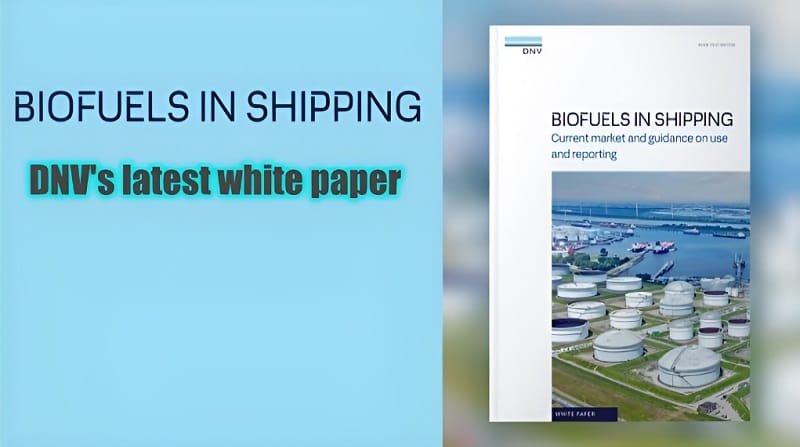DNV, a world-leading assurance and risk management company, has released a new white paper titled “Biofuels in Shipping,” which sheds light on the growing potential of biofuels to significantly reduce greenhouse gas (GHG) emissions in the maritime industry.
The report emphasizes the importance of biofuels, such as FAME (Fatty Acid Methyl Ester) and HVO (Hydrotreated Vegetable Oil), in supporting compliance with maritime regulations aimed at reducing the sector’s environmental impact. However, the uptake of these biofuels in shipping faces challenges due to potential supply limitations in the future.
The paper highlights that, while biofuel use is on the rise, in 2023, the maritime sector consumed just 0.7 million tonnes of oil equivalent (Mtoe) of liquid biofuels, accounting for a mere 0.6% of the global liquid biofuel supply and just 0.3% of shipping’s total energy use. This underscores the limited current uptake of biofuels in shipping compared to other sectors. Despite this, biofuels have substantial potential to support GHG reduction efforts and facilitate compliance with key regulatory frameworks, including the Carbon Intensity Indicator (CII), the European Union Emissions Trading System (EU ETS), and FuelEU Maritime.
For biofuels to deliver their environmental benefits, DNV stresses that they must meet strict sustainability and GHG savings criteria, verified through a Proof of Sustainability (PoS) or similar documentation. However, the long-term viability of biofuels in the maritime sector depends on the availability of sustainable biomass at an affordable price and competition with other industries that also rely on biofuels for their own decarbonization efforts.
DNV’s research involved in-depth interviews and written surveys with eight biofuel suppliers and 12 shipping companies. The findings reveal that over 60 ports have carried out biofuel bunkering operations since 2015, with Singapore and Rotterdam accounting for approximately half of all biofuels supplied to the shipping industry in 2023. This demonstrates the growing number of bunkering ports that have embraced biofuels in recent years, signaling progress toward decarbonizing maritime fuel use.
Knut Ørbeck-Nilssen, CEO of Maritime at DNV, commented, “Biofuels present a promising decarbonization option for shipowners, and it’s encouraging to see steady growth in the number of bunkering ports offering biofuels in recent years. However, the long-term future of the maritime biofuel market hinges on the availability of sustainable biomass at an affordable level, as well as competition with other sectors. Shipowners should, therefore, aim to explore energy efficiency measures and alternative fuels as part of their wider decarbonization strategies, while utilizing biofuels where they are available and affordable.”
In the technical and operational realm, the majority of biofuel consumption in shipping today occurs through fuel blends, with biofuels like FAME and HVO combined with conventional oil-based fuels. DNV’s report outlines key technical and operational considerations for using biofuels as “drop-in” fuels. These include essential recommendations for shipowners, such as verifying fuel quality, assessing compatibility with onboard systems, and continuously monitoring fuel performance to avoid potential operational risks.
Øyvind Sekkesæter, Consultant in Maritime Environmental Technology at DNV and Lead Author of the white paper, emphasized the importance of technical compatibility: “The technical compatibility of key marine biofuels like FAME and HVO varies from ship to ship, making it essential to assess each case individually. Doing so will ensure that the fuel specification and quality are compatible with their intended application, minimizing the risk of damage to equipment and loss of power onboard the vessel.”
DNV’s report provides valuable insights into the future of biofuels in the maritime industry and highlights both the opportunities and challenges of adopting these fuels at scale. The company’s role in ensuring the safe, smart, and sustainable use of biofuels is crucial to supporting the transition towards a decarbonized shipping sector.
For further details, you can download the full report from DNV website.
Biofuels in Shipping
About DNV
DNV is a world-leading assurance and risk management company, enabling safe, smart, and sustainable business operations. Through its expertise in energy, shipping, and technology, DNV is driving the transition toward a decarbonized future.
Source DNV

